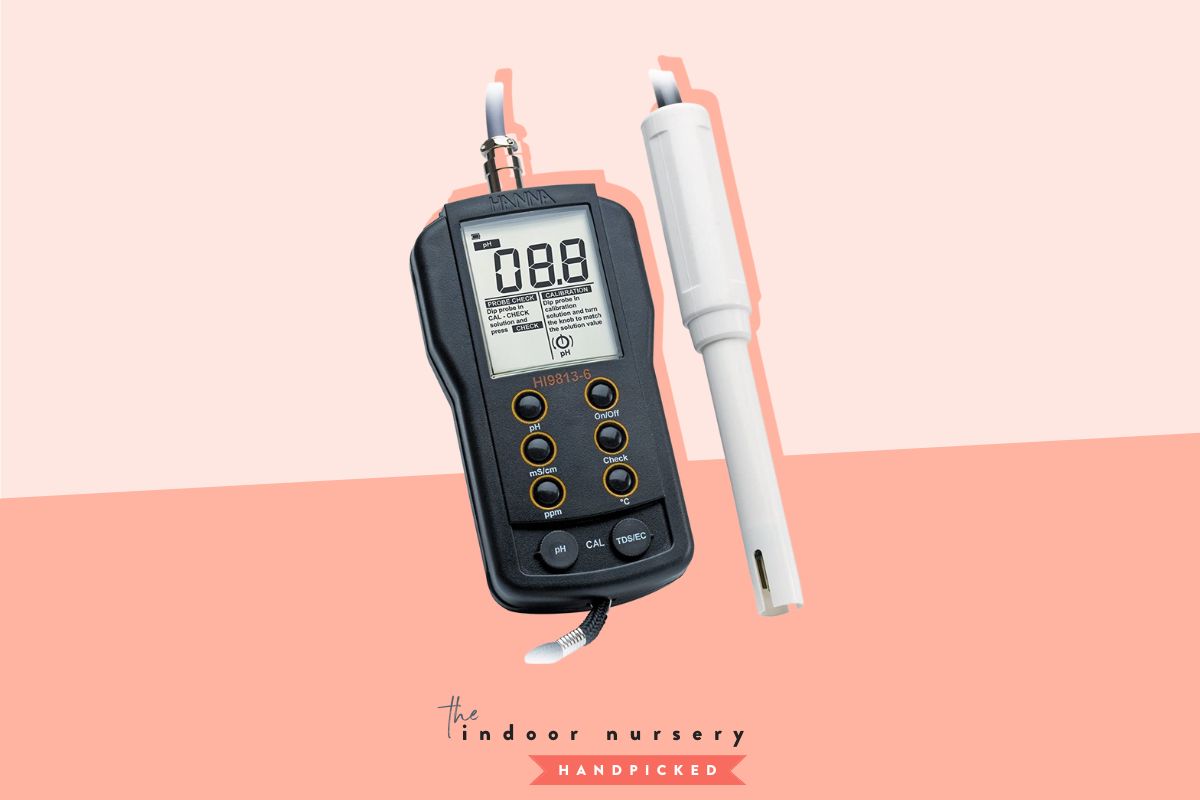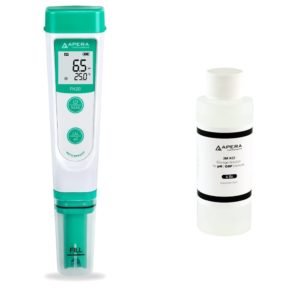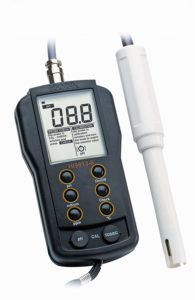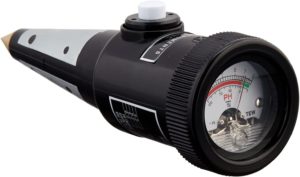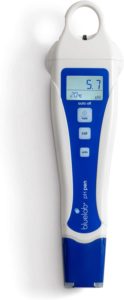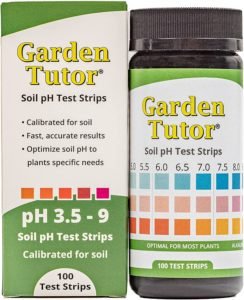🧪 Our review process
Our testing team independently researches, tests, and recommends the best products to help keep your houseplants absolutely thriving. Learn more about our testing and review process here.
In this guide, we recommend the best soil pH testers for a variety of growing scenarios, whether tending to indoor plants or growing cannabis. We include it all, from digital pH meters to good, old-fashioned manual pH testers, test strips and combo meters that track temperature as well as pH.
So let’s find the best pH meter for you 😉
Here’s what we recommend:
The best soil pH testers for indoor plants
1. Best soil pH tester overall: Apera Instruments pH 20 Waterproof pH Tester Kit
Key specs: temperature and pH readings | pH pen tester | powered by electrical potential (AAA battery powered)
This pH meter kit from the testing supplying company Apera Instruments is an excellent all-around choice for maintaining healthy soil with regular pH testing. Made from high-quality plastic and powered by AAA batteries, the digital screen is easy to read and the single-pronged probe is clearly designed to last more than a growing season.
We recommend swinging for the full kit, which includes a carrying case and storage solution, to maintain the life of this quality product.
Pros
- Fully waterproof
- Comes with a full kit, including pH meter, storage solution, and a carrying case with very cool lanyard 😎
- ±0.1 pH accuracy in temperatures ranging from 32° to-122°F and automatic temperature compensation
- 6-month warranty
Cons
- Customer service isn’t on point: Many reviewers report non-response when attempting to collect on the warranty
2. Best bargain soil pH tester: VIVOSUN 3-in-1 Soil Tester, Plant Moisture Meter Light and PH Tester
Key specs: soil moisture/light/pH tester | high-strength plastic | powered by electrical potential (no batteries required)
This is probably the pH meter that comes to mind when you imagine pH meters in general. It’s handy, it’s cheap, and it’s definitely popular with your average indoor gardener. Don’t expect accurate readings from this device though. The simple, manual meter will guide you to catching major imbalances, but won’t catch subtle shifts in pH. Read my tips below for how to get the most accurate measurement from this tool.
Pros
- Moisture range of 1-10 (dry to moist), light intensity of 0-2000(low light to strong light) and pH level of 3.5-8.0
- Handy, one-and-done guide for checking up on your houseplants
- 10.8 inch probe will reach the root zone of most potted plants
Cons
- Not waterproof: Designed for testing soil ONLY
- Not really accurate, especially in alkaline soils
3. Best professional soil pH meter: Hanna Instruments HI 9813-6N Waterproof pH/EC/TDS Meter
Key specs: measures pH, electro-conductivity (EC), and total dissolved solids (TDS) | hand-held pH meter | 9V battery powered
When nothing but the best will do for your growing ambitions, this pH meter from the veteran analytical instrument supplier Hanna Instruments is your best option. It delivers accurate EC readings within a range of 0.00 to 4.00 mS/cm, TDS readings from 0 to 1999 ppm, and full scale pH measurements. Its crisp LCD screen is a standout feature. Paired with six buttons plus calibration dials, the large display and controls are easy to read and offer a seamless user experience.
NOTE: Do examine the probe before setting this pH meter up at home though – many customers report defects.
Pros
- Easily readable LCD screen
- Comes with meter, probe, 1 meter cable, calibration solution, cleaning wipes, a hard carrying case, battery and detailed instructions
- Most durable device on our list, functioning in a temperature range from 0°- to 140°F and
- Super accurate, delivering readings from pH 0 – pH 14 with a resolution of ±0.1
Cons
- Some customers experience issues with broken or defective probes, which is irritating at this price point
4. Best heavy duty soil pH meter: Kelway HB-2 Soil pH and Moisture Meter
Key specs: pH and moisture meter | pH pen tester | powered by electrical potential (no batteries required)
There’s nothing better than a product that just works. And that’s exactly what you get with the Kelway soil pH tester and moisture meter. This two-in-one product looks and feels like a heavy flashlight with a tapered end, making it an excellent pick for gardeners who plan to test pH indoors and out, and anyone who just tends to break things: This meter is designed to stand up to rough handling, unlike the meters with thin probes that tend to snap on contact with hard surface.
Pros
- With the size and weight of a flashlight, you know from picking it up that this thing is solid
- Super easy to use! Simply switch functions with the press of a big white button
- Measures pH values from 3.5 to 8.0 with an accuracy of ±0.2 and soil moisture from 0-100% with an accuracy of ±10%.
- Comes with a cowboy-style pleather carrying case 🤠
Cons
- At 6-1/2″, this probe might not reach the root zone of your larger indoor trees and houseplants
- The recommended proprietary conditioning film is unfortunately not included with this pH meter
5. Best pH meter for hydroponics: BlueLab pH Pen
Key specs: temperature and pH readings | pH pen tester | powered by AAA batteries
When growing hydroponic plants, gardeners rely on dependable, accurate pH readings – sometimes on a daily basis. The BlueLab pH Pen is a gold standard in the hydroponic tool kit department, guaranteeing auto-calibrated readings with a ±0.1 resolution. The BlueLab pH Pen is a fully waterproof, soundly-engineered digital pH meter that won’t disappoint. The probe does require maintenance with KCL solution and calibration solution that are both sold separately, so make sure to consider this expense in your budget!
Pros
- Fully waterproof and ideal for testing hydroponic media (floats in solution)
- Easy two point calibration with included calibration solutions
- Automatic temperature compensation
- Full 1-year warranty with proof of purchase
Cons
- Does not include the calibration solution, cleaning solution, or KCL hydration solution required to use the pen
6. Best manual pH test kit: Garden Tutor Soil pH Test
Key specs: simple pH strips | 100 single-use pH strips | colormetric results
Our guide to pH meters wouldn’t be complete with the backup test that every serious gardener has in their kit: Regular old pH test strips. pH test strips never run out of batteries or calibration solution, they can’t break, and they’ve been around for ages, so are generally quite reliable within their stated range of accuracy. We recommend keeping a pack of these on hand to cross-check unusual results from your pH meter.
Pros
- Super affordable!
- Delivers accurate results within the pH range from 3.5-9.0
- Results in 60 seconds
- Comes with instructions for correcting pH imbalances with lime and sulfur application
Cons
- Single-use tests generate more waste and require re-stocking
- Delivers results within a limited pH range
To use pH test strips, simply dip the strip into the solution you want to test and compare the color of the strip to a chart that comes with the strips. The chart will give you a range of pH values that correspond to different color shades on the strip.
While pH test strips are a convenient option, they may not be as accurate or precise as a pH meter. They also have a shorter shelf life and can become less reliable over time, so it’s important to store them properly and replace them regularly.
If you’re using pH test strips for soil testing, keep in mind that you’ll need to mix a small amount of soil with distilled water to create a solution for testing. This can add an extra step to the testing process, but it’s important to ensure accurate results.
While pH test strips are a simple and affordable option for testing pH levels, they may not be as accurate or precise as a pH meter. If you’re looking for more precise and reliable readings, a pH meter may be a better option for you.
Best Soil pH Tester Kits
| # | Preview | Product | Amazon rating | |
|---|---|---|---|---|
| 1 | Best overall pH meter: Apera Instruments pH 20 Waterproof pH Tester Kit | 4.5 out of 5 | view on amazon | |
| 2 | Best bargain pH meter: VIVOSUN 3-in-1 Soil Tester, Plant Moisture Meter Light and PH Tester | 4.1 out of 5 | view on amazon | |
| 3 | Best professional pH meter: Hanna Instruments HI 9813-6N Waterproof pH/EC/TDS Temperature Meter | 4.4 out of 5 | view on amazon | |
| 4 | Best heavy-duty pH meter: Kelway – HB-2 Soil pH and Moisture Meter | 4.2 out of 5 | view on amazon | |
| 5 | Best pH meter for hydroponics: BlueLab pH Pen | 4.5 out of 5 | view on amazon | |
| 6 | Best manual pH tester: Garden Tutor Soil pH Test | 4.2 out of 5 | view on amazon |
Still unsure which one is the best pH meter for you?
There are lots of soil pH testers are out there and the price range is seriously wild. If the choice between digital pH meters, manual pH meters, or just plain old pH test strips has your head spinning, we’ve rounded up some information to guide your decision. We’ll start with a primer on why it’s a good idea to measure soil pH in the first place and what to do about imbalances, and then get nitty gritty about the different types of meters, how they work, and best practices for calibrating and caring for them.
What’s the ideal soil pH, anyway?
So what are we going for when testing soil pH? No matter what type of soil (or soilless soil) you’re working with, the sweet spot for growing most plants is within the pH range of 6.5 to 7.5.
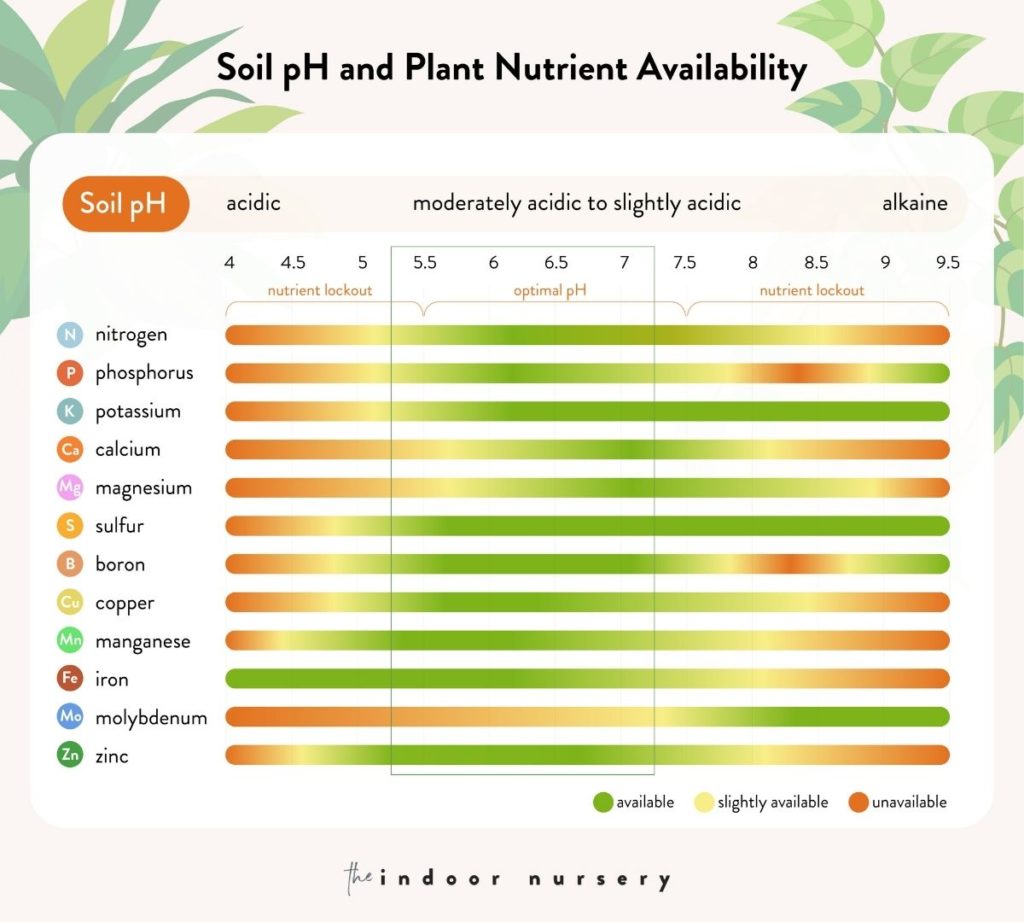
When the pH of a solution is too low or too high, certain plant nutrients will become unavailable to plants. This is known as nutrient lockout. For example, at a pH of 4.5, phosphorus becomes unavailable, while at a a pH value of 9.5, nitrogen becomes unavailable. This can be a major problem for plants, as it can limit their growth and development.
Luckily, for plants grown in soil, gardeners will sometimes amend soil with different ingredients.
What to do if your soil is alkaline
Soil is considered alkaline if it has a pH above 7.0. Slightly alkaline soil isn’t cause for concern, but you should make some changes if your soil pH tester returns readings over 7.5.
There are a few things you can do to re-balance your soil in this case. If your plant is visibly suffering, consider repotting your plant in a buffered soil mix. If your plant is close to death, however, avoid repotting (at least right away), since this could send your plant’s roots into shock.
For an immediate fix, use a soil acidifier / pH down amendment like horticultural aluminum sulfate as directed and stop fertilizing your plant until it recovers.
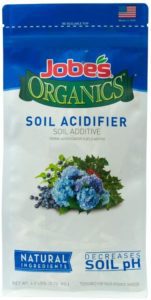
When your plant is ready to re-pot, make sure your soil mix includes some of the following amendments to prevent the pH from rising into the danger zone again.
It might also be a good idea to test the pH of the water you use to hydrate your plants and switch to a lower-pH fertilizer than whatever you were using before.
What to do if your soil is acidic
Acidic soil is a more common challenge for gardeners than alkaline soil. One of the most common reasons that soils take a sour turn is the use of fertilizers high in phosphorus and sulfur that build up in soil over time.
To rescue plants suffering from acidic soil, sprinkle 3 Tbsp of dolomitic lime over the soil for every 6″ of plant diameter and water gently.
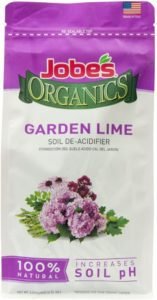
Once your plant is healthy enough for a new home, mix up a DIY potting soil that includes some of the following amendments to keep your soil from returning to an acidic pH:
- garden lime
- bone meal
- compost
- wood ash
How to get the most accurate soil pH measurement
- Water plants thoroughly before pH testing: Water has a significant effect on the pH of soil. The water you use to hydrate your plants can have a pH range of anywhere from 6.5 to 8.5, depending on its mineral and chemical content. To control the effect of water on your pH results, always test immediately after you water your plants – and use room temperature water.
- Always test at room temperature: pH values have an inverse relationship to temperature, meaning you’ll get higher than usual pH measurements when it’s a bit cool and lower than usual pH readings when it’s toasty. Before taking a pH test, make sure that the water, your plant’s soil, and the ambient temperature is somewhat average to get accurate and consistent readings.
- Calibrate your pH meter: pH meters can fall out of calibration if exposed to extreme temperatures, humidity, or liquid (if they’re not waterproof). Even without damage, the electrical charge of meters with probes will weaken over time simply by exposure to elements.
FAQs
What is the most accurate type of pH meter?
If accuracy is top priority for you, we recommend choosing amongst digital pH meters that report reading within ±0.1 and have features like automatic temperature compensation, auto calibration, and come with a warranty from the manufacturer. Look for products that function in a wide temperature range and deliver pH readings on the full scale (many cheaper models won’t read anything below 4.0 or above 9.0), and be prepared to spend $50 or more.
How often should I calibrate my pH meter?
If you’re working with plants in soil, it’s generally a good idea to calibrate your pH tester once a month. If you’re growing plants hydroponically, though, you’ll want to calibrate daily to make sure you catch any pH swings before they do damage to your plants.
Can I use pH test strips instead of a pH meter?
Yes, you can use pH test strips instead of a pH meter! pH test strips are a simple and affordable option for testing the pH of soil or water.
Do pH meters come with calibration solutions or do I need to buy them separately?
Some pH testers come with calibration solutions included, while others don’t. It really depends on the specific pH tester you choose. If the pH meter you select doesn’t include calibration solutions, don’t worry – you can purchase them separately. It’s crucial to calibrate your pH tester regularly to maintain accurate readings, so make sure you have the right solutions on hand.
Can I use the same pH meter for both soil and water testing?
In short, the answer is “it depends.” Some digital pH meters are designed for both soil and water testing, while others are specialized for one or the other. However, even if a pH meter is marketed as suitable for both soil and water testing, it’s important to read the product specifications and instructions carefully to ensure that it’s truly versatile.
Just be sure to clean and calibrate the meter between uses, as soil can leave behind debris and minerals that can affect the accuracy of the meter when testing water.
Conclusion
There you have it. Purchasing a soil pH tester isn’t just about building out your plant care kit to be the envy of your houseplant enthusiasts (LOL no judgements if that’s your jam though). When you begin to measure pH levels, you really begin the intimate and lifelong journey of caring for your plants. You understand them at the pH level 😍
Before long, you’ll be mixing up your own DIY soil (like us) to give your plants the perfectly-balanced nest they deserve. So go forth, and build a soil that would make your parents proud!
Shop our recommendations
- The Best Hydroponic Tower For Indoor Gardening
- 10 Best Worm Composter Bins For Easy Homemade Compost
- The Best pH Meter For Soil
- The 6 Best Dehumidifiers For Grow Tents
- The Best Complete Indoor Hydroponic Grow System
- 5 Best Grow Light Strips For Indoor Plants
- TESTED: Aerogarden vs Click and Grow Smart Garden
- Our *hands on* MARS HYDRO TSW 2000 review (with photos)
- 7 Best Hygrometers For Indoor Plants
- The Best Coco Coir For Your Plant’s Healthiest Root System Ever

